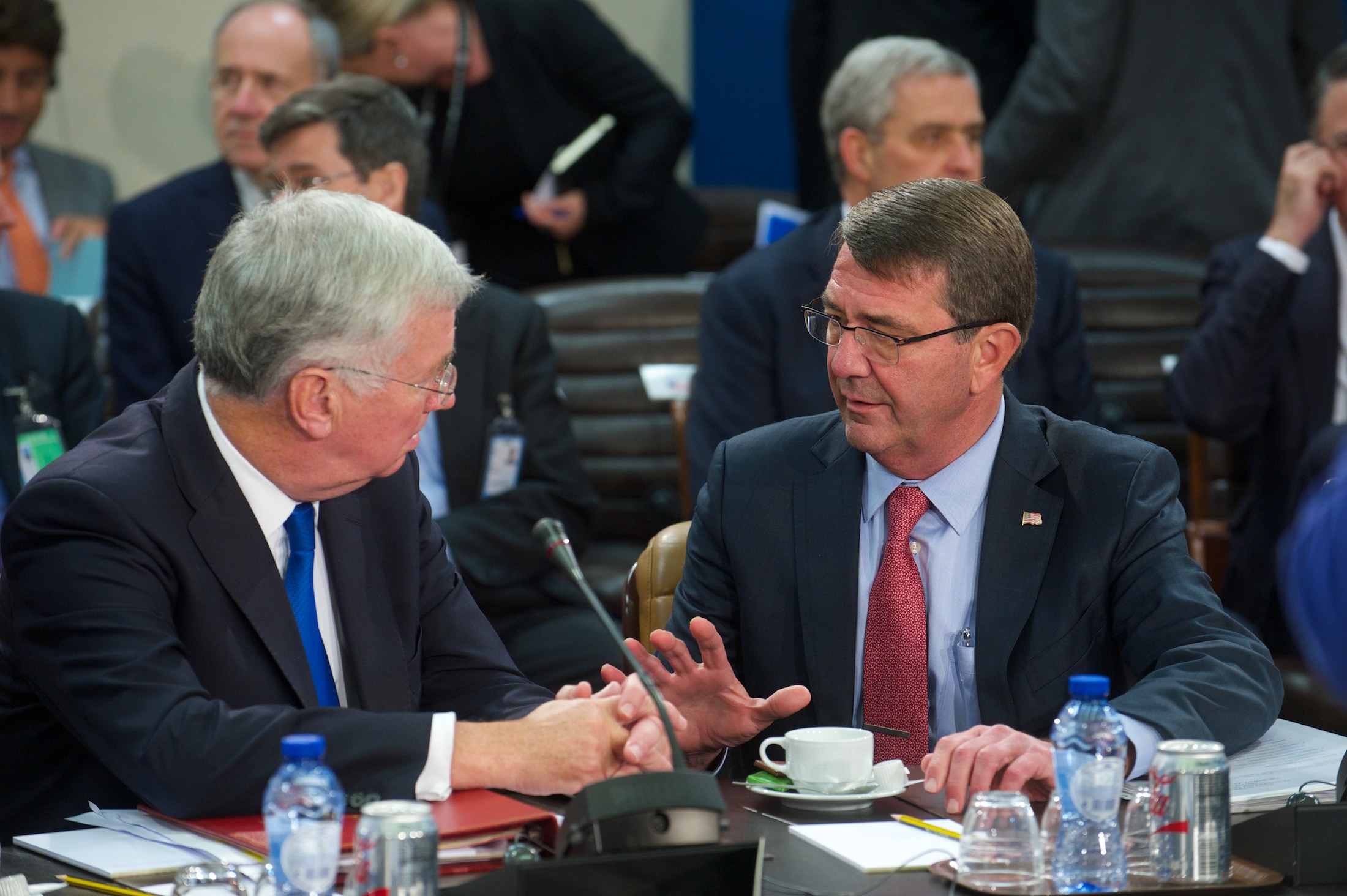By Cheryl Pellerin DoD News, Defense Media Activity
WASHINGTON, October 8, 2015 — During a busy meeting today at
NATO headquarters in Brussels, defense ministers discussed Afghanistan, Russian
activities in Syria, and how NATO is adapting to meet future threats, Defense
Secretary Ash Carter said during a scheduled press conference.
Carter is in Belgium to attend the NATO Defense Ministerial
as part of a five-day trip to Europe featuring meetings with counterparts in
Italy, Spain and the United Kingdom.
Carter said, “We had, as we always do, direct, substantive
conversations about how we can better address the common challenges we face and
to reaffirm the enduring principles and great strength we share as members of
the alliance and as individual partners.”
On the sidelines of the meetings held in Brussels today,
Carter met with French Minister of Defense Jean-Yves Le Drian, according to a
Defense Department news release.
Carter and Le Drian reaffirmed the importance of the
enduring defense partnership between the United States and France, and the two
leaders discussed a range of security issues, including Russian activities in
Syria, and the need to maintain the pace of counter-ISIL coalition operations,
the release said.
Carter thanked Le Drian for his leadership role in
countering terrorism worldwide, the release said.
Ripple Effects
Earlier this week, Carter visited Defense Minister Pedro
Morenes in Spain and Defense Minister Roberta Pinotti in Italy.
In both nations, he said, “I witnessed U.S. troops working
and training with their counterparts to meet the challenges facing NATO's
southern flank, including the ripple effects of [the Islamic State in Iraq and
the Levant] and state instability in North Africa and the Middle East.”
Two weeks ago he met with Norwegian Defense Minister Ine
Eriksen Soreide to discuss challenges in the north and east, and tomorrow he’ll
visit British Defense Secretary Michael Fallon in the United Kingdom.
There, he noted, the government recently announced it will
meet the pledge all NATO allies made last year to invest no less than 2 percent
of gross domestic product in defense.
Actions in Afghanistan
On Afghanistan, Carter said the United States is taking
three actions.
The first is President Barack Obama’s March decision to
maintain 9,800 U.S. troops in Afghanistan through the end of this year, and the
second is to formulate options for 2016 and beyond, and adjust the planned U.S.
presence in Afghanistan based on current circumstances.
“I was pleased, very pleased, to hear ministers of defense
from our NATO allies reaffirm their commitment -- discussing not whether but
how to continue the mission in Afghanistan. And of course, that is also the
view of the United States,” Carter said.
The third action involves the fiscal year 2017 defense
budget, in which the secretary said he would include “critical financial
support to the Afghan national defense and security forces” to help it sustain
its current force levels of 352,000 troops in 2017 and beyond.
“I think it's widely understood that we need to do an
assessment. It's widely understood that the United States is doing an
assessment and, as other countries have, a number of countries today indicated
a willingness to change their own plans and posture,” the secretary added.
Russia in Syria
On Russia’s actions in Syria, Carter said that, rather than
engaging in a Syrian political transition, Russia has chosen to continue its
longstanding relationship with the Assad regime by committing more military
hardware capabilities and personnel to the fight there.
Instead of targeting ISIL, al-Nusra and other terrorist
organizations, Carter said that the Russians began striking other kinds of
targets within days of deploying their forces.
“I have said repeatedly over the last week that we, the
United States, believe this is a fundamental strategic mistake and that it will
inflame and prolong the Syrian civil war,” the secretary said.
He added, “We have not and will not agree to cooperate with
Russia so long as they continue to pursue this misguided strategy.”
Russian forces also have violated Turkish airspace, shot
cruise missiles without warning from a ship in the Caspian Sea, flown within a
few miles of U.S. unmanned aerial vehicles, and initiated a joint ground
offensive with the Syrian regime, Carter said.
“This will have consequences for Russia itself, which is
rightfully fearful of attack upon Russia. And I also expect that in coming days
the Russians will begin to suffer casualties in Syria,” he added.
Open Door
Going forward in Syria, Carter said, the United States will
prosecute the counter-ISIL air campaign in Syria at the same pace and in the
same battle space as it has since the campaign began.
“We will continue to support the moderate Syrian opposition.
We will seek an agreement with the Russians on professional safety procedures
for coalition pilots. And we will leave the door open for Russia to rejoin the
track toward a political transition in Damascus,” he said.
If Russia wants to end its international isolation, it must
stop its aggression in eastern Ukraine, end its occupation and attempted
annexation of Crimea, and live up to its commitments under the Minsk
agreements, Carter said.
There's a reason why the NATO alliance is stronger than ever
while Russia acts alone, he added.
“Our member nations share common values reflected in the way
we conduct ourselves. … We treat each other as equals and take each other's
interests into account. … That is the core of the NATO alliance and the
community of nations it brings together, and that is what we shall all continue
to do,” Carter said.








No comments:
Post a Comment